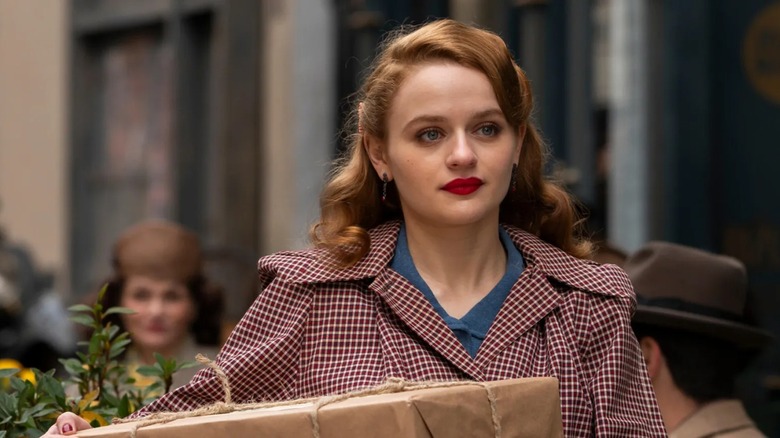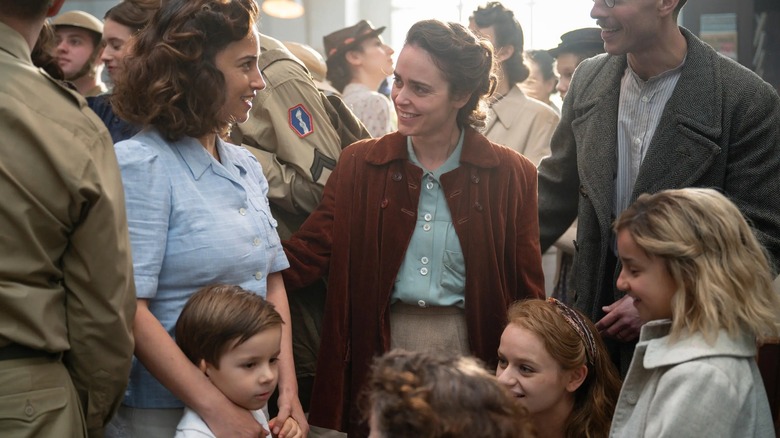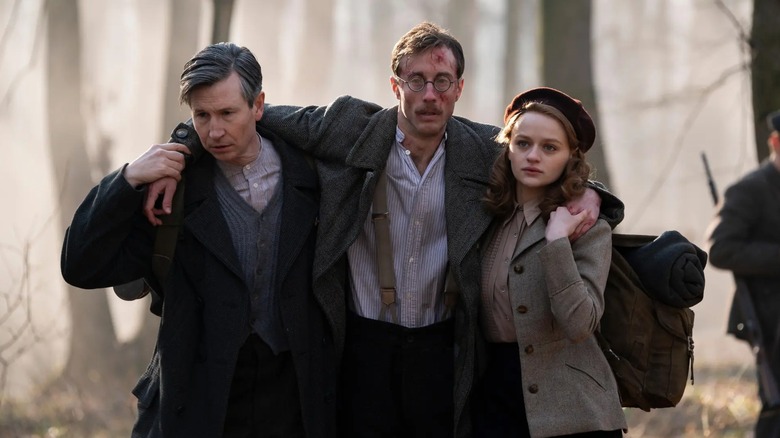The True Story Behind Hulu's We Were The Lucky Ones, Explained
Erica Lipez's eight-part historical drama, "We Were the Lucky Ones," deals with a harrowing subject matter. The year is 1938, and the Polish city of Radom is home to the Kurc family, who gather together to celebrate Passover. These are turbulent times, as vicious anti-semitism is on the rise in Poland, and the Kurcs initially seem insulated from everyday racial politics due to their social stature. As the Kurcs gather around the family table, we are introduced to each member, including siblings Halina (Joey King) and Addy (Logan Lerman), who talk about their hopes and dreams paving the path for the future. The older Mila (Hadas Yaron) is excited about giving birth to her first child, while Jakob (Amit Rahav) gushes about his passion for photography. In a heartbreaking turn of events, this family gathering turns out to be the last one as the Kurcs get separated with the advent of war.
Is "We Were the Lucky Ones" a true story? It's certainly inspired by a true story, and the Hulu miniseries is based on Georgia Hunter's eponymous novel. Hunter drew from her own family's experiences during Nazi Germany's occupation of Poland in 1939, detailing how her loved ones were torn apart. Spending nine years researching her family's survival story and weaving elements of it into her novel, Hunter wrote a visceral story underlining what it meant to be a young Polish Jew during World War II. The author talked about this blend of history and fiction in her work during an interview with Book Club Babble:
"My goal in writing 'We Were the Lucky Ones' was not only to tell the story in a way that did the family justice, but that also allowed readers to step into my relatives' shoes [...] And so while my narrative is based on actual people and real events, I decided in the end to allow myself the creative license to fictionalize it—to add those human, emotional details I wasn't able to uncover in my research, such as what my characters were thinking and saying and feeling."
Let's take a look at how the Hulu adaptation tackles the heavy themes of the book, and learn more about the real-life story that informs both the book and the series.
Hulu's We Were the Lucky Ones dramatizes the real-life struggles of the Kurc siblings
The Kurc family is directly based on Hunter's great-grandparents and their five children who got separated during the Nazi invasion in 1939. Addy, who was on the verge of traveling to Paris before the separation (in the series), is based on Hunter's grandfather, a composer/engineer who lived in France. When Hunter first learned about her grandfather's past as a Holocaust survivor, she started piecing together aspects that were lost to time, such as the sheet music for a song he composed, known as "The List." Lerman's character plays an excerpt from "The List" in the show, which makes for a sweet, tender homage to the real composer who lovingly crafted it.
While some nuances tend to get overlooked during such a personal restoration process, Hunter tackled this by extending her research beyond what happened to her family. She detailed her process in the same interview (linked above), talking about little pieces of information falling into place to paint a soul-shattering picture:
"Where there were gaps in my timeline, I looked to outside resources—to archives, museums, ministries, and magistrates around the world, in hopes of tracking down relevant information. Over time, and with the help of translators, I sent out queries in Polish, French, Russian, and German, little by little collecting details from organizations near and far, including a nine-page statement hand-written by one sibling, extensive military records for others [...] the first-hand accounts of three relatives who had since passed, captured on video by the USC Shoah Foundation's Visual History Archive.
Genek Kurc (Henry Lloyd-Hughes) — the oldest sibling in the series — is based on Hunter's granduncle, and you can read his abovementioned nine-page statement here. Also, Halina's real-life counterpart protected her parents by helping them get jobs at a gunpowder factory with forged identities. Just like the Hulu show portrays, the real-life siblings had to navigate their own struggles after being forced to separate from one another.
Is We Were the Lucky Ones different from the eponymous book it is based on?
Although the Hulu series is pretty faithful to Hunter's book, some differences emerge with dramatization and certain storytelling choices. For example, the novel starts with the perspective of Addy, who is already in Paris and unable to go back home for Passover. His mother, Nechuma (played by Robin Weigert in the show), sends him a letter warning about the tensions near German borders. In contrast, Hulu's "We Were the Lucky Ones" opts for a nonlinear approach, opening with Halina at a Polish Red Cross office in 1945. Here, she is relieved to find out that her brother Genek and his family are alive after the war. After this point, we rewind to the 1938 Passover gathering. The choice to open with a positive aftermath and then plunge into the story helps build crucial context and establish our investment in Halina's dynamic with her loved ones.
An understandable sacrifice that the series makes comes in the form of reduced perspectives. The book, which weaves in and out of the perspectives of a large, scattered family is able to make space for alternate POVs of the same incident. As the series cannot accommodate every POV, it roots us in two major perspectives — Addy's and Halina's — and puts their experiences at the forefront to frame the larger picture. This, again, is a change that works in favor of the adaptation, as it allows the events to flow and connect better, while appropriately highlighting the fate of every Kurc affected by the war.
Apart from this, some character aspects have been changed to generate greater stakes. Examples include Halina's relationship with Adam (Sam Woolf), which is invested with more conflict and tension, and Halina playing a more active role as a part of the underground Polish resistance movement.
In the end, the surviving Kurcs celebrate Passover again and grieve the people they lost. The credits reveal that more than 100 Kurc descendants are alive today.


